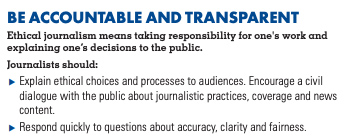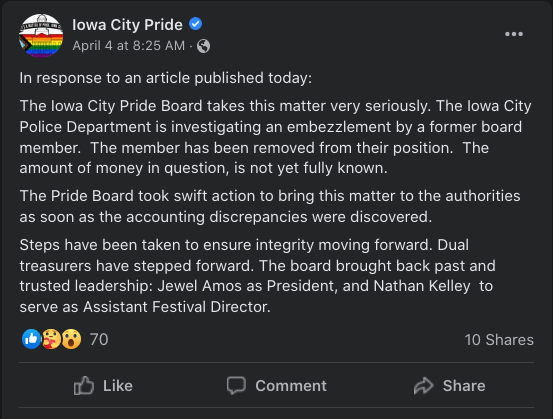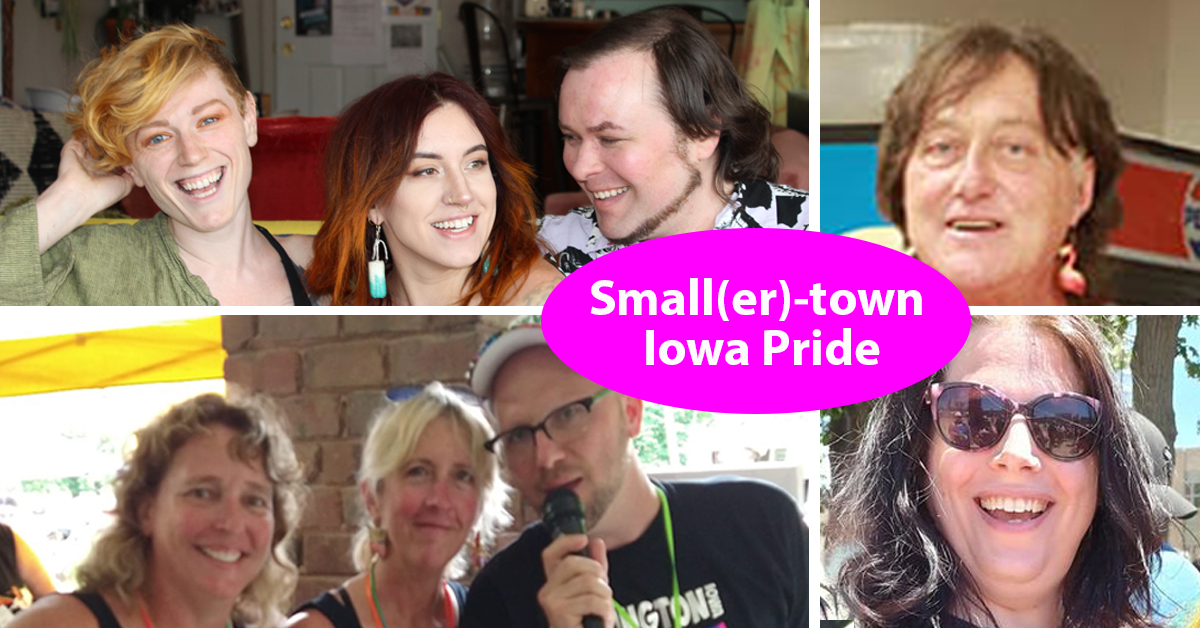I wrote one of the hardest stories I’ve ever had to write, earlier this week.
It was a piece about $30,000 in donations to a revered LGBTQ+ Pride organization that is “unaccounted for.” I wrote it as a freelance writer for another publication, but an angry social media poster dragged The Real Mainstream into the public controversy by dredging up a three-year-old blog I wrote after my own tumultuous departure from Iowa City Pride.
The angry poster insinuated I had “bias” and was attacking the Pride group for my own difficult time. Sadly, the attack strategy directly resembled a threat I’d received from a community power broker trying to intimidate me from writing the piece.
Lies, exclusivity, normalization and intimidation forced the story
So I feel this is time to honor that part of the SPJ Code of Ethics that calls us to explain our actions. Here’s why I went from “compassion and context lead me to refrain from attempting to break this story in any way” to “I have to write it.” Here’s why I wrote that piece in the Iowa City Press-Citizen, though I knew it would expose Iowa City Pride to scrutiny and criticism, leave homophobes and extreme conservatives with ammo to attack, and would likely expose myself to new levels of gossip and innuendo.

- Lies: When I first found an indication of trouble at IC Pride, in December while seeking to confirm dates for the 2022 event for a story about Quad Cities Pride Festivals and Pride events in general, I reached out to someone who I believed was “in the know.” They assured me sponsor monies had been secured, that no one was saying anything to anyone because of “the investigation,” that the whole mess came to light through “a tip from a friend” (no mention of a bounced check or audit!), and that the board was starting with “a clean slate.” But little by little, without trying, I learned none of this was true. And if there is one thing that even baby cub reporters know they must do, it’s dig deeper at the sight (and site) of untruths. So I turned up the reporter knob, and sought to learn through public records what was going on, rather than continue trusting a background source that had now proven to be unreliable.
- Exclusivity: Though the official line was “no comment” until the investigation was over, it became apparent that certain people in certain circles were getting an up-front seat to the drama unfolding behind the scenes. Some people knew a LOT! Some people were sharing a LOT with some people. Sponsors and others appeared to be clueless.
- Normalization: As the months wore on, and I watched and waited and asked for the opportunity to even ask any questions, everything slowly appeared to be returning to its former state. All the board members whose names had been removed were reinstated (which mattered only because of the earlier lies). I observed a troubling normalization of a situation that I knew, by then, was deeply abnormal in many ways. As a longtime practicing journalist who learned the importance of recognizing normalization long before Trump made that five-syllable word a household word, I was growing more concerned by the week.
- Intimidation: Weeks before the article was published, a community power broker threatened to release information to the public that they were certain would discredit me and any article written about the missing funds. Just like discovering an untruth, all journalists are trained from the word “go:” when you are threatened, you must push forth. You no longer have a choice.
I knew that publishing this story would lead to a rough time for me personally. It’s not unlike stories I’ve written about gas pipelines plowing their way through sensitive environmental land, or sexual relations between intertwined government employees, or well-disguised fugitives on the run with unsavory secrets to hide. Nobody likes the bad news – and the more important that bad news is, the more people tend to shoot the messenger.
I’m used to that. It will pass.
And it could very well be that Iowa City Pride and its former president has, or finds an explanation for, the missing $30,000. Harsher media that followed up my original story after finding the public records themselves chose to describe this as a blatant embezzlement, as has Iowa City Pride itself; I’ve actually been the softest linguist of the bunch, instead describing the money as “unaccounted for” or spent “without the board’s authorization.”

Could be we’ll discover all of or most of that $30,000 was spent on reasonable items, but the board just got a little lax over the years and began to skip formalities. On the other hand, could be all of that money was indeed expended by one person left by all of their colleagues with unfettered access for months to a five-digit account that the team was obligated to watch over as a board.
I do know that having documented what’s actually going on, free from anyone’s spin and based entirely on public records and expert input, we have a greater chance as a community of knowing what actually happened. This means we also have a better chance of this happening less often, whether in Iowa City or in other Pride groups or small nonprofits.

Some duties need to transcend friendship circles
Which brings me to my final two points about “why I wrote it.” I also began to realize that already, it appeared the same mistakes were happening again – and that was something the board hasn’t really stepped up to the plate to face: the over-influence of friendships on duties that needed, truly needed, to transcend such circles.
Friends had surrounded the person accused of embezzlement during the months of suspected embezzlement; friends knew all about it afterwards. Friends talked about it among themselves, and many different circles dealt with it in different ways. The rest of the community? Well, it began to appear we were expected to join the audience just like before, speak only adulations and thank-you’s as usual, or give money again — only in greater amounts than ever before.
This form of privileged access through friendships, which I’d watched morph over months, was yet another reason I had to follow through despite the risk it may pose to me personally or emotionally.
You may not be ready to see it this way yet – but writing this story was, in addition to being difficult, a show of deep, unfathomable respect for my LGBTQ community, whether that be in Iowa City where I lived and worked for four years, or the Quad Cities where I’ve now lived for two years, or Florida where I lived and worked for 25 years.
LGBTQ+ exceptionalism – or better yet, marginalized exceptionalism – is real. I believe we are capable of embracing expectations to give our best. I believe that when we DO give our best, the entire world is better off for it, in ways only we marginalized communities can provide.
I believe we gain from openly embracing or addressing our weaknesses, not by evading or “spinning” them. I believe in endlessly trying again, no matter what mistakes are made, and I believe deeply that Iowa City Pride and all Pride organizations deserve our support.
Support for Iowa City Pride likely to grow more now
In fact, I predict that allowing the public the same access to information about the missing donations, as the board and its friends, will actually trigger MORE donations to Iowa City Pride. I believe more support will come forth, from more and new people, to help the board offset the disaster of whatever happened to that $30,000. I predict that 2022 will be the biggest year ever for Iowa City Pride.
I also hope that the group itself soon offers some humility – not just an insistence that “it takes this matter seriously,” but also an acknowledgment, even just a hint of one, that it could have headed this off by taking matters more seriously before.
We’re going to keep on publicizing Iowa City Pride events along with the hundreds of other Pride events we help to showcase each year. Even when people skip over 10 or more supportive articles of Iowa City Pride to find the ONE piece that expressed criticism, pre-COVID … we’re still here for you, and I’m still here for you. And I’m certain the community is still here for you, stronger than ever.







